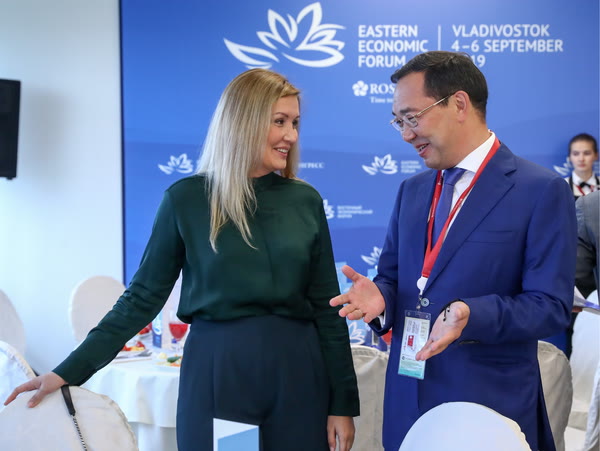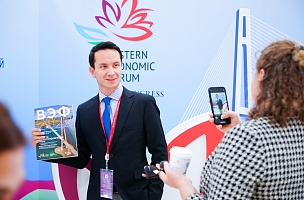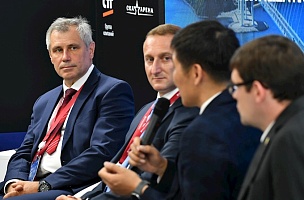KEY CONCLUSIONS
The Far East sees an upsurge of business
“In the first half of this year, a long-term negative economic trend
finally reversed. <...> This year, for the first time we see the GDP grow by almost
5%, industrial production grew by 2.5%. <...> Unemployment decreased by
1%,” Alexander Osipov, Acting Governor of Trans-Baikal Territory.
“The Republic of Sakha (Yakutia) and Kamchatka Region have already made
it to top 30 regions best for entrepreneurship, <...> 9 out of 11 regions
demonstrated an improved dynamics of most national rating indicators, there are
45 of them,” Svetlana Chupsheva, General Director, Agency for Strategic Initiatives
to Promote New Projects.
“Many regions have improved their performance in absolute numbers but
lagged in relative numbers, which suggests that competition is on the rise,”
Andrey Sharonov, President, Moscow School of Management SKOLKOVO.
PROBLEMS
Imperfect legislation and high administrative
pressure
“In the Far East regions, <...> 53% of entrepreneurs report heavy
administrative pressure from regional and municipal administrations, less than
20% report on federal authorities, <...> 42% of entrepreneurs complain of
courts of general jurisdiction, <...> 55% – of power supply
organizations,” Svetlana Chupsheva, General Director, Agency for Strategic
Initiatives to Promote New Projects.
“There are significantly fewer inspections. <...> But the routine
and unscheduled audits have been conveniently replaced with unofficial
inspections. <...> Prosecutor’s office has no control over these,” Boris
Titov, Presidential Commissioner of the Russian Federation for the Protection
of Entrepreneurs’ Rights.
“Often, administrative pressure is directly related to the gaps in the
existing legislation. For example, foreign labour legislation has huge
loopholes. Today, the immigrant workforce can be brought to the region without
a quota under the guise of skilled international specialists. It is a major
issue for the border regions,” Vasily Orlov, Governor of the Amur Region.
“The Republic of Buryatia is the most overregulated region in
environmental legislation. <...> The number of inspections grew
significantly. About 30% of small business in tourism shut down just this year
alone. <...> A venue may cost RUB 100 thousand and be ready in a month.
An audit will cost RUB 300 thousand and takes two months – environmental audit
of literally everything,” Alexei Tsydenov, Head of the Republic of Buryatia.
Tax increase due to transition to cadastral
valuation
“Several regions of the Far East are switching to cadastral valuation
and relevant taxation. In Primorye, the cadastral valuation grew 2–10 times.
<...> Real estate owners are under serious risk, their survival is
jeopardized,” Alexander Kalinin, President, All-Russian Non-Governmental
Organization of Small and Medium-Sized Businesses OPORA RUSSIA.
“What does business do? It takes an independent assessment and goes to
court. They even slam the old evaluations,” Alexander Levintal, Governor of the
Jewish Autonomous Region.
Shortage of human resources
“The Far Eastern small and medium enterprises turnover grew by 5.2%. But
on the other hand, the number of employees in SMEs decreased by 3.7%. That is
40 thousand people. <...> The personnel issue is becoming the most
acute,” Alexander Kalinin, President, All-Russian Non-Governmental Organization
of Small and Medium-Sized Businesses OPORA RUSSIA.
“The number of people graduating from internationally recognized
professional training courses is half of the Russian average,” Robert Urazov,
Chief Executive Officer, Agency for the Development of Professional Communities
and Skilled Workers (WorldSkills Russia).
“We can train quickly and efficiently. But what do we have? There is no
place for them on the labour market,” Petr Shchedrovitskiy, Member of the
Management Board, North-West Foundation Centre for Strategic Research.
Lack of funding
“Our financial sector density is very low; we should have established
institutions years ago. Lack of funding has a big impact on any development
plans,” Alexander Osipov, Acting Governor of Trans-Baikal Territory.
“An unbalanced budget impedes the achievement many objectives,”
Alexander Levintal, Governor of the Jewish Autonomous Region.
SOLUTIONS
Consistent dialogue between the state and business
“The new format of dialogue with business is an unambiguous growth
prerequisite. <...> We had fully re-established the coordination council
for entrepreneurship: before it was 30% business and 70% state officials. Now
we have 92% of small business representatives,” Aysen Nikolaev, Head of Sakha
Republic (Yakutia).
“Success lies in the communication between business and regulatory
bodies. This year we have created a very effective “Boiling Point”,” Vasily
Orlov, Governor of Amur Region.
“Several projects are worth mentioning, but the most significant one is
the ‘Regulatory Guillotine’. The business should be directly involved.
<...> Business should not be designated, but rather consolidate its
position,” Alexander Shokhin, President, Russian Union of Industrialists and
Entrepreneurs (RSPP).
Optimization of regulation
“One of the solutions: if the audit data is not entered into the Unified
Register of Inspections, its results shall be deemed invalid. <...> The
second solution is to analyse and summarize the identified and confirmed
violations. In turn, the regulatory authorities have already agreed to outline
a step-by-step procedure to prevent major violations,” Alexander Braverman,
General Director, Chairman of the Board, Russian Small and Medium Business
Corporation.
“It is necessary to ensure a smooth transition from a fixed tax on
potential gross income to the patent taxation system. <...> Unless it is
done, we are to face a surge of social tensions and small business dropping off
the radar,” Alexander Kalinin, President, All-Russian Non-Governmental
Organization of Small and Medium-Sized Businesses OPORA RUSSIA.
“One window investment decision-making: investors see a full set of
projects offered in the district, and <...> decide in favour of an
investment team,” Igor Shchegolev, Presidential Plenipotentiary Envoy to the
Central Federal District.
“Moving on to ASEZ and Vladivostok Free Port, all those receiving
benefits, <...> if you don’t pay taxes, getting top margin, you should
raise wages. The analytics show nothing like this happening,” Sergey Furgal,
Governor of Khabarovsk Territory.
State financial support
“We have kept direct measures of financial support for business.
<...> Firstly, we are talking about business on the ground floor setting
up its operations. Such support is essential for them. The demand for micro
financing remains high,” Vladimir Ilyukhin, Governor of Kamchatka Territory.
Identifying jobs in demand in cooperation between
the state, business and educational institutions
“Within three months, we are to prepare a long-term jobs outlook for
each region considering the objectives of the national projects, especially in
terms of the infrastructure development,” Andrei Belousov, Aide to the
President of the Russian Federation.
“And we are creating a single window to the Far Eastern Federal
University for all investors of the Far East. <...> This year, 1,500
students have already completed internships at enterprises,” Nikita Anisimov,
Rector, Far Eastern Federal University (FEFU).
“The peculiarity of Chukotka is such that it does not imply a dynamic
population growth of the region. It partly results in human resource imbalance.
At the same time, we have major investment projects in the region. <...>
Over the past few years more than 3,000 jobs emerged. With all the companies in
the region, there is a basic agreement that all Chukotka people, including the
indigenous peoples, shall be employed,” Roman Kopin, Governor of Chukotka
Autonomous Area.
For more information, visit the Roscongress Foundation’s Information and
Analytical System at roscongress.org/en.






